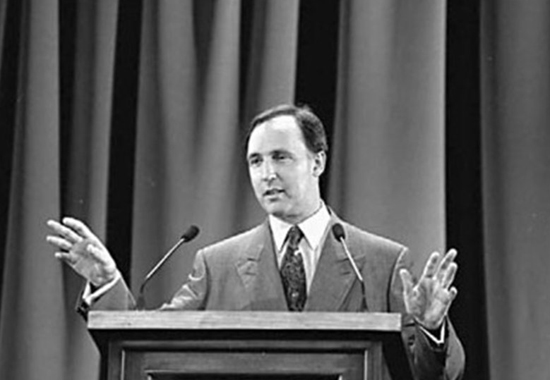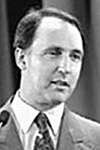|

WHAT IT MEANS TO BE AUSTRALIAN -
PAUL KEATING 1993
Funeral Service for the Unknown
Australian Soldier
It follows the full text transcript of
Paul Keating's speech at the Ceremony of
the Entombment of the Unknown Soldier, delivered at Canberra, Australia
- November 11, 1993.

 |
We do not know
this Australian's name and we never will. |
We do not know his
rank or his battalion. We do not know where he
was born, or precisely how and when he died. We
do not know where in Australia he had made his
home or when he left it for the battlefields of
Europe. We do not know his age or his
circumstances - whether he was from the city or
the bush; what occupation he left to become a
soldier; what religion, if he had a religion; if
he was married or single. We do not know who
loved him or whom he loved. If he had children
we do not know who they are. His family is lost
to us as he was lost to them. We will never know
who this Australian was.
Yet he has always been among those we have
honored. We know that he was one of the 45,000
Australians who died on the Western Front. One
of the 416,000 Australians who volunteered for
service in the First World War. One of the
324,000 Australians who served overseas in that
war, and one of the 60,000 Australians who died
on foreign soil. One of the 100,000 Australians
who have died in wars this century.
He is all of them. And he is one of us.
This Australia and the Australia he knew are
like foreign countries. The tide of events since
he died has been so dramatic, so vast and
all-consuming, a world has been created beyond
the reach of his imagination.
He may have been one of those who believed the
Great War would be an adventure too grand to
miss. He may have felt that he would never live
down the shame of not going. But the chances are
that he went for no other reason than that he
believed it was his duty - the duty he owed his
country and his King.
Because the Great War was a mad, brutal, awful
struggle distinguished more often than not by
military and political incompetence; because the
waste of human life was so terrible that some
said victory was scarcely discernible from
defeat; and because the war which was supposed
to end all wars in fact sowed the seeds of a
second, even more terrible, war - we might think
that this Unknown Soldier died in vain.
But in honoring our war dead as we always have,
we declare that this is not true.
For out of the war came a lesson which
transcended the horror and tragedy and the
inexcusable folly.
It was a lesson about ordinary people - and the
lesson was that they were not ordinary.
On all sides they were the heroes of that war:
not the generals and the politicians, but the
soldiers and sailors and nurses - those who
taught us to endure hardship, show courage, to
be bold as well as resilient, to believe in
ourselves, to stick together.
The Unknown Australian Soldier we inter today
was one of those who by his deeds proved that
real nobility and grandeur belongs not to
empires and nations but to the people on whom
they, in the last resort, always depend.
That is surely at the heart of the Anzac story,
the Australian legend which emerged from the
war. It is a legend not of sweeping military
victories so much as triumphs against the odds,
of courage and ingenuity in adversity. It is a
legend of free and independent spirits whose
discipline derived less from military
formalities and customs than from the bonds of
mateship and the demands of necessity.
It is a democratic tradition, the tradition in
which Australians have gone to war ever since.
This Unknown Australian is not interred here to
glorify war over peace; or to assert a soldier's
character above a civilian's; or one race or one
nation or one religion above another; or men
above women; or the war in which he fought and
died above any other war; or of one generation
above any that has or will come later.
The Unknown Soldier honors the memory of all
those men and women who laid down their lives
for Australia.
His tomb is a reminder of what we have lost in
war and what we have gained.
We have lost more than 100,000 lives, and with
them all their love of this country and all
their hope and energy.
We have gained a legend: a story of bravery and
sacrifice and with it a deeper faith in
ourselves and our democracy, and a deeper
understanding of what it means to be Australian.
It is not too much to hope, therefore, that this
Unknown Australian soldier might continue to
serve his country - he might enshrine a nation's
love of peace and remind us that in the
sacrifice of the men and women whose names are
recorded here there is faith enough for all of
us.

More History
|
|